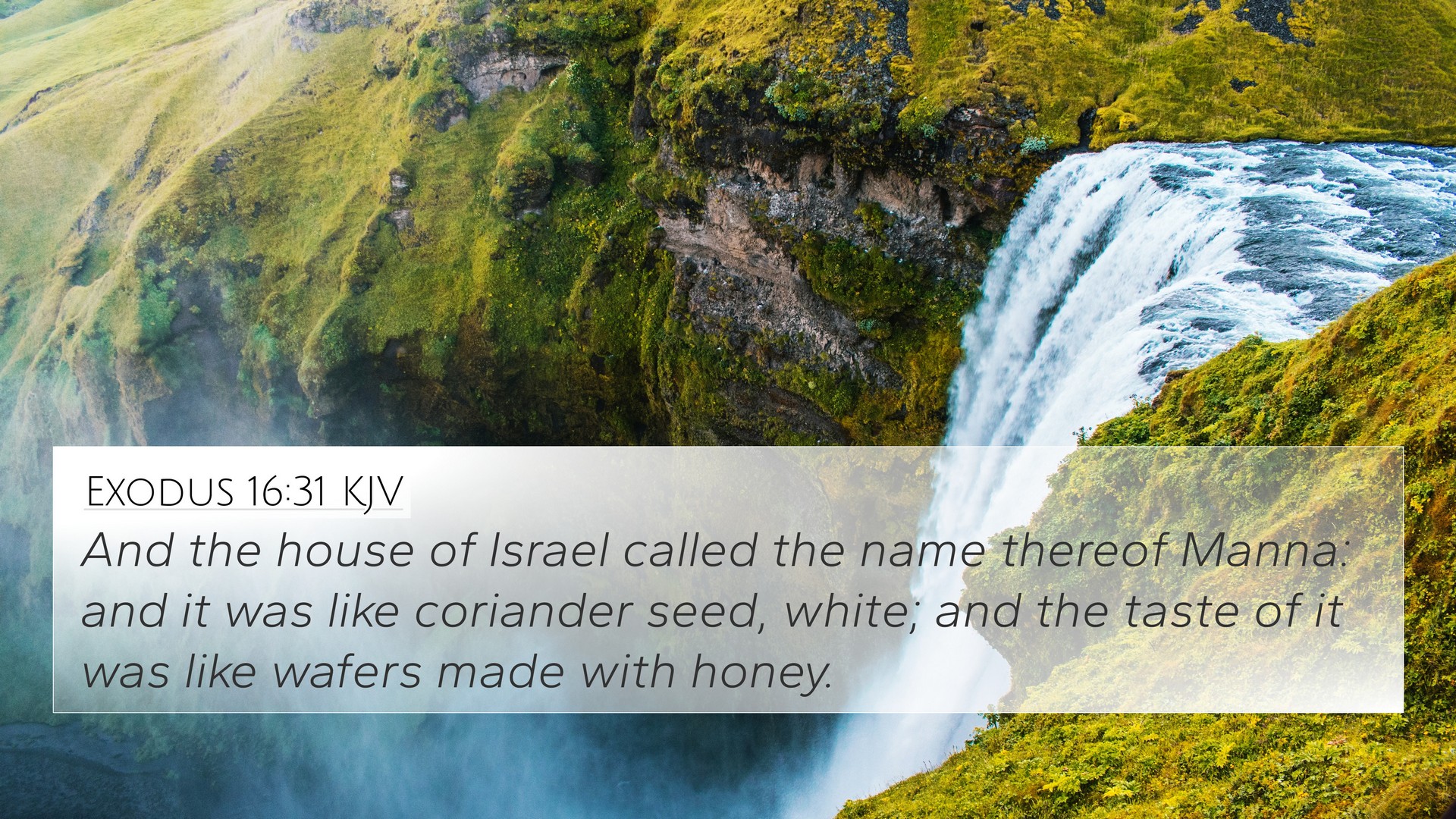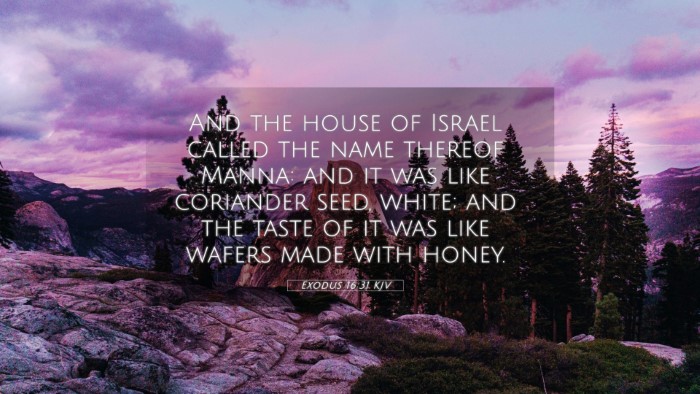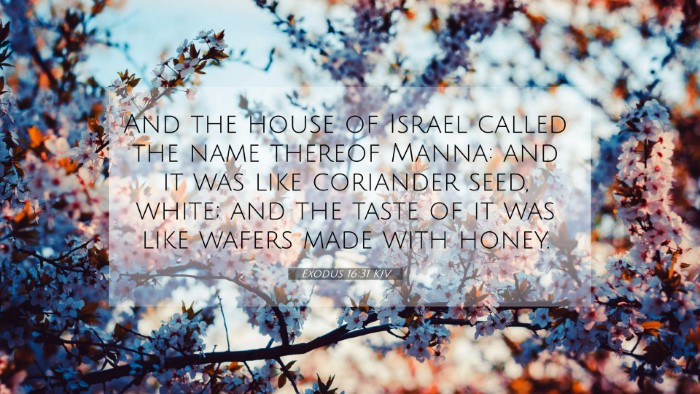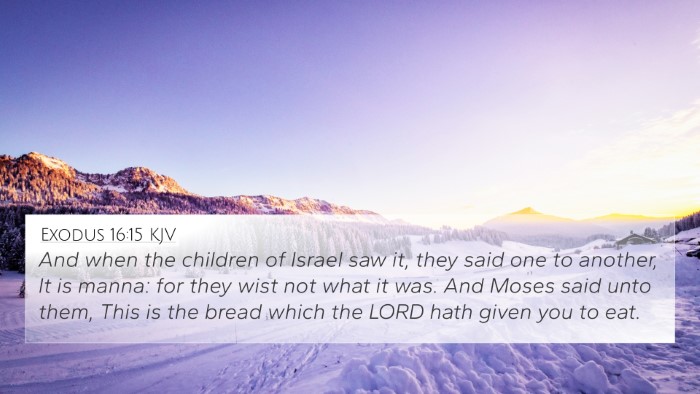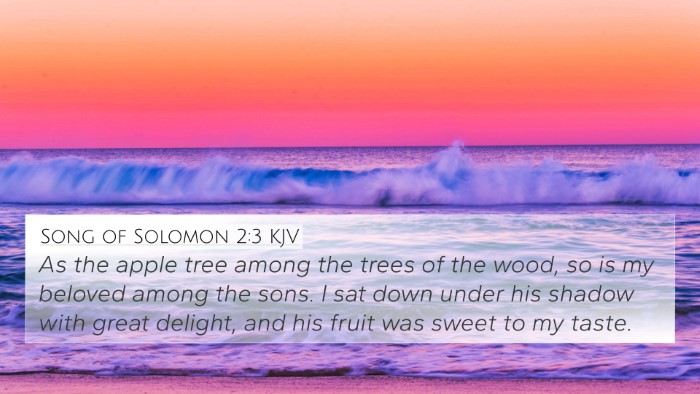Exodus 16:31 - Overview
Exodus 16:31 states, "And the house of Israel called its name Manna. And it was like white coriander seed, and the taste of it was like wafers made with honey." This verse describes the miraculous provision of manna, a heavenly food provided by God to the Israelites during their journey in the wilderness. The significance of this scripture lies in its deeper theological implications and the way it connects with other Biblical themes.
Context and Importance
The surrounding context of Exodus 16 reveals Israel's complaints about food after their escape from Egypt. God responds with a solution that not only meets their physical needs but also serves as a test of their faith. The provision of manna represents God's continual care, and the verse showcases Israel’s acknowledgment of God's miracle, emphasizing the need to remember and value God's provisions in their life.
Commentary Insights
- Matthew Henry's Commentary: Henry emphasizes that manna was a divine answer to the Israelites' murmuring. He presents it as a symbol of God’s providence and grace. The taste being like wafers made with honey illustrates the sweetness of God's gifts, contrasting the bitterness of their previous bondage in Egypt.
- Albert Barnes' Notes on the Bible: Barnes points out the importance of the name 'Manna,' which translates to ‘What is it?’ This highlights the mystery of God's provision—something that is beyond human understanding. He notes that the manna’s appearance and taste contributed to its miraculous nature, reinforcing the Israelites' dependence on divine sustenance.
- Adam Clarke's Commentary: Clarke describes the texture and taste of manna vividly, expressing it to be not just physical nourishment but also a spiritual reminder of God’s covenant with Israel. He links this sustenance to spiritual nourishment found in Christ, citing John 6:31-35, where Jesus declares Himself the "bread of life."
Biblical Cross References
Exodus 16:31 is closely tied to several other passages throughout the Bible, enhancing its meaning through inter-Biblical dialogue:
- Numbers 11:7-9: Further descriptions of manna emphasize its heavenly qualities and dependence on God's provision.
- John 6:31-35: Jesus references manna in the context of explaining His role as the spiritual bread, drawing a connection between physical and spiritual sustenance.
- Deuteronomy 8:3: Reflects on God's provision in the wilderness as a means to teach dependence on His Word, further aligning with the themes from Exodus.
- Psalm 78:24-25: Recalls the miracle of manna, illustrating God's mercy and how it fed the Israelites during their trials.
- Matthew 4:4: Jesus quotes Deuteronomy to assert that man shall not live by bread alone, emphasizing the importance of spiritual nourishment, reminiscent of the manna.<
- Revelation 2:17: Promises hidden manna to believers, symbolizing eternal sustenance and spiritual fulfillment.
- Hebrews 9:4: Refers to the manna being placed in the Ark of the Covenant, signifying its importance as a reminder of God's faithfulness.
Connecting Themes and Applications
The themes of Exodus 16:31 resonate throughout scripture, linking to various aspects of faith, dependence, and praise. The act of Israelites naming the manna signifies the importance of recognizing God's gifts in our lives. This is similar to how we ought to meditate on the blessings and provisions from God today.
For those studying scripture, understanding the connections through cross-referencing provides profound insights. A Bible concordance can be a valuable tool for exploring these intersections. When conducting a comparative Bible verse analysis, consider how Exodus 16:31 relates to both the Old and New Testaments, revealing patterns of God's ongoing engagement with His people.
Conclusion
Exodus 16:31 is much more than a historical account; it serves as a reflection on divine sustenance, appreciation of God's provisions, and a reminder to live in constant dependence on Him. Through careful study and cross-referencing, believers can deepen their understanding and application of this scripture in their daily lives.
